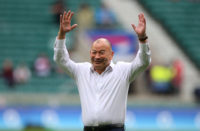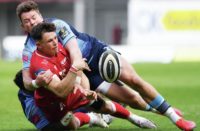Schalk Burger, a 2007 World Cup winner with South Africa and veteran of 86 caps, tells NEALE HARVEY why he isn't ready to quit yet and why rugby in both the Northern and Southern Hemispheres is in urgent need of an overhaul.
This is your 18th pre-season. At 35, does your passion for rugby burn as brightly as ever?
The season is a big commitment now and pre-season gets harder, especially around getting my motivation for that, but my enthusiasm for the game is the same as it's ever been. I enjoy playing and I like everything about the week before a game; it's like free shots of adrenaline before running out on the pitch and that's where you want to express yourself. A lot of older players in various sports feel that way, and as you get older you also have the ability to see different things when the game's going on, whereas I didn't have the time or mental capacity to do it at 20. Physically, at 20 I could tackle a bus, whereas now I'm more human and you have more time to analyse things from having seen certain things happen time and again.
Younger Saracens players like Ben Earl, 20, say they appreciate tapping into your back row wisdom. Is that something you enjoy passing on?
I think I am quite approachable, especially with the guys in and around my position. There are a lot of pressures on young guys like Ben Earl to break through at a club like Saracens, where there are so many good rugby players. You maybe get one opportunity but one of the biggest mistakes young guys can make is actually wanting it too much. You've almost got to just do your thing, you don't have to be extraordinary, and I like playing with guys like Ben because I can give them confidence. It's nice to spend time with them over a round of beers discussing what pressures they're under and whether they're happy. The club gives us that opportunity to facilitate in all walks of life and there's no hierarchy. Whether you're a guy starting out, like Ben, or an experienced international, that's why Saracens is such a seamless place to fit in.
What do you make of Ben's chances, and which other young Saracens back rowers have impressed you?
Ben hasn't played too much rugby for Saracens yet, but he was brought into the England squad this summer and once he gets an opportunity here he's got to make that No.7 jersey his own. Nick Isiekwe is a really talented player who got his opportunity last year and blossomed and I expect Ben to do the same. Joel Conlon's a little older and has had injuries but he's another nice player who's going to get a chance, while Jack Nay is coming through fast as well and you can see there's a lot of potential there.
Is patience sometimes a virtue for these guys?
You need a bit of luck sometimes as well. When I started my career at Western Province there were so many good loose forwards in South Africa that you think you're about 21st in the queue, but then somehow, though injury or a coach giving you a chance, you're running out for your club or country and thinking how surreal it is. Rugby changes quickly and the biggest thing for a lot of young players is keeping your head down and steadily improving every time you go out and train. I was fortunate, I made my South Africa debut during the 2003 World Cup at 20 and very quickly had 30 or 40 caps. After that, my experience kept me a step ahead of the rest.
Nick Isiekwe was hauled off just 36 minutes into England's first Test against South Africa recently. What did you make of that decision from Eddie Jones?
At first you're wondering if he's injured, but then when you realise he was just pulled off early you fear it will leave a scar. Eddie's done that with a few other players in the past and it's worked for him where he's altered the flow of a game, but this time it didn't change the game. Coaches sometimes get gut feelings and there's nothing science can prove. Sometimes they get it right, sometimes not.
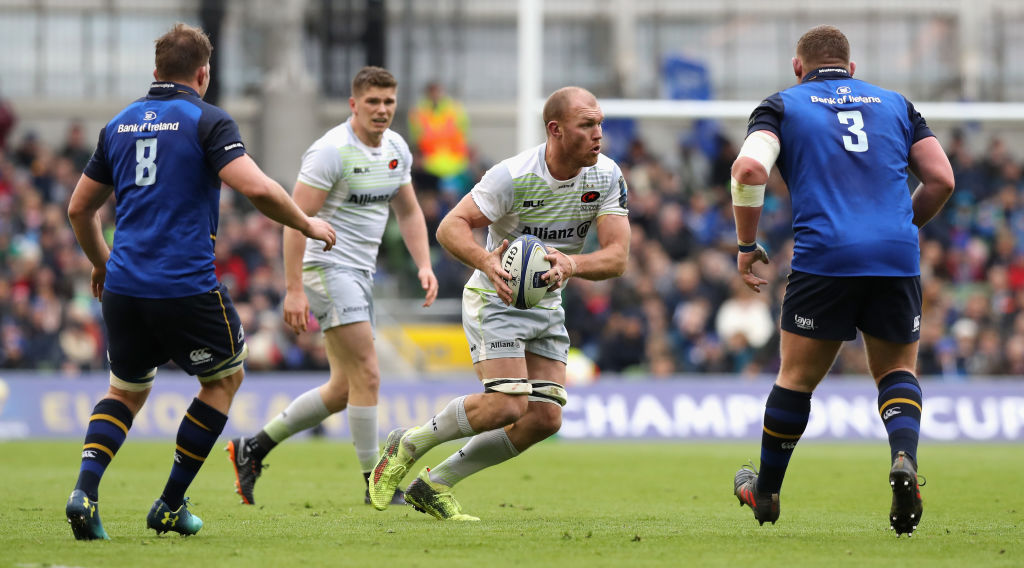
How do you think it might affect Isiekwe moving forward?
At Saracens it won't adversely affect him at all. He's going to come back and slot straight into his position and the players will just accept him as Nick Isiekwe. It might put him under a bit more pressure the next time he gets selected by England, though, because he'll be reminded of it. At Saracens he's got no scar tissue – he's won trophies here and played well, so he'll put the Saracens jumper on and crack on – but there might be some scar tissue in an England jumper and there is going to be that fear he'll have a mental hurdle to get over.
What did you think of South Africa winning that series 2-1?
The first two Tests in Johannesburg and Bloemfontein were exciting to watch from a South African point of view. I've played in a lot of those games at altitude where it's too fast, too helter-skelter and that's what eventually did for England. At the end of the day the ball is your friend and if you don't have it in those conditions you're in trouble. Those two Tests showed it.
Have South Africa turned the corner under Rassie Erasmus?
There's still a long way to go tactically and technically. Rassie obviously hasn't had a lot of time with the Springboks, which is why the third Test was always going to be tough. He made changes, but it was difficult conditions – windy, wet and with a heavy field – and you could see England's back row was very effective there. A guy like Chris Robshaw would have arrived in Cape Town, seen the storm and thought, ‘this is what I was made for!'. Our guys didn't quite have the skill-set to dominate the game like they did in Johannesburg and Bloemfontein, where we played with high tempo and amazing physicality, which put England under a lot of pressure.
Where does South Africa stand ahead of the Rugby Championship?
We can't be considered as genuine World Cup candidates yet, but, having said that, Rassie is going to get it right and the England series proved that we still have some super-talented athletes. From that perspective it was exciting and the tough part for Rassie now going into the Rugby Championship is how he's going to manage winning Test matches whilst creating depth in his squad, which is in short supply. We need cover at No.8, nine, ten, 12 and 15 and in Cape Town he tried to give a few other guys a chance but it didn't really work. It's going to be a heck of a juggling act for him because the public will still demand results come what may, but he knows he can't enter a World Cup campaign without depth.
Was it the right call bringing back some expats?
Absolutely. What Rassie's already done better than the previous regime is blend in the overseas Springboks, and Faf de Klerk, Willie le Roux and Duane Vermeulen were our best players of the series. Vincent Koch, our prop at Saracens, would have been in there as well had he not injured an arm, but I expect he'll be drafted in soon as well and that's really exciting. It will be a hell of a job to get South Africa ready for the World Cup but Rassie's a good coach who understands the game and he'll get a lot of buy-in from guys who want to play for him.
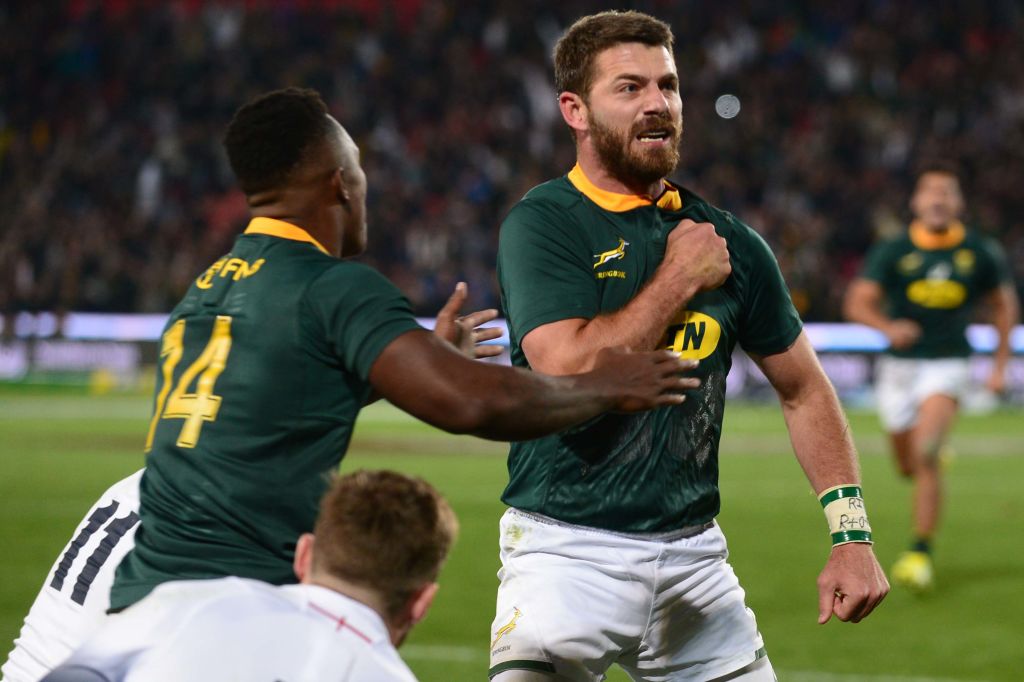
Back to yourself, how many miles have you left on the clock? After all, you're well into extra laps now after suffering a life-threatening illness in 2013.
I always wanted to play until 35 but I've got one more year left at Saracens and whether I'll head home and play a bit longer after that, I can't say yet. I can't talk about retirement because as Schalk Brits has just shown, he retired for all of ten days and then played for the Springboks! What horrifies you sometimes is the amount of injuries I've had and I obviously had some big stuff going on with the meningitis five years ago, but I'm still here. I'll aim to finish this season in England, which is a pretty big ask as it is with the final not being until next June.
You missed last season's Premiership final with a hamstring strain. How's that injury coming on?
I'm a couple of weeks from running and that will be the big test. At the moment I'm in the gym doing the bike and cross-trainer and that feels really good. It's probably working in my favour at the moment because it's saved me from all that pre-season running! At this stage of my career, a shorter pre-season is not a bad thing and for the first time in a long time I've had a proper break and been able to enjoy myself a bit more.
How much pride did you take from winning last season's Premiership?
It was my first title here and it was so satisfying for all involved. We went through a pretty big wobble in November and December, losing so many games in a row, but the work we put in after that was amazing. Losing at Leinster in the Champions Cup was disappointing and we were still in a bit of a transition phase then with guys coming back from internationals and injury, but to keep improving under intense pressure and beat Wasps and Exeter in the play-offs the way we did was testament to the work the guys put in. Our head of conditioning, Phil Morrow, right, and his guys deserve huge credit, too, because they manage a big squad of players superbly well. I've worked in a lot of high performance environments and this one's up there with the best.
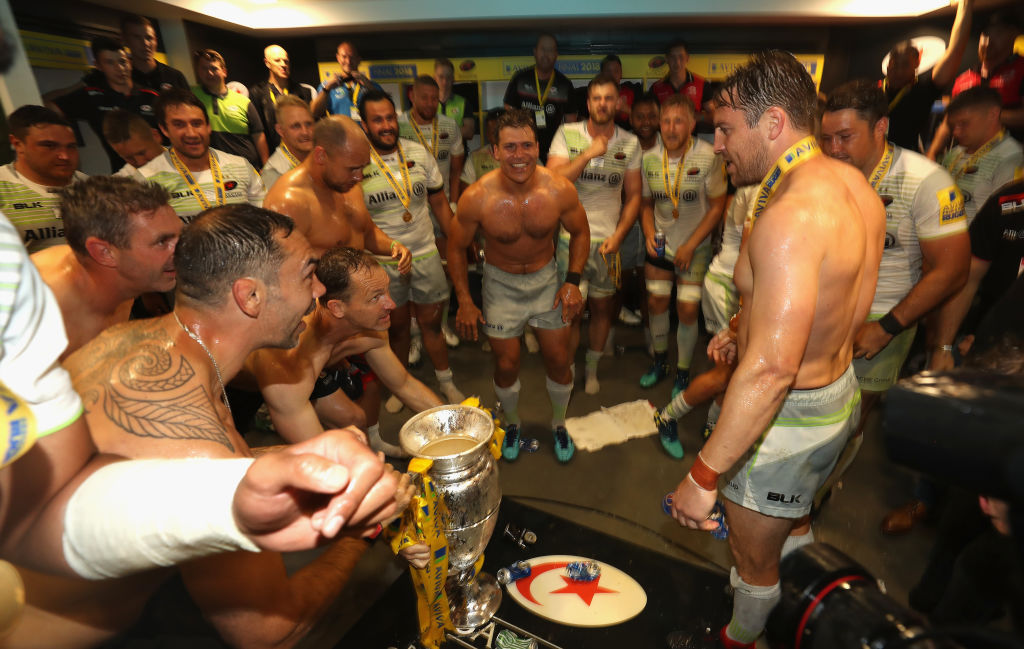
Your large quota of Test stars always seem to slot back in so smoothly, whereas some other clubs find that difficult. What's the Saracens secret?
It's great kudos to all those guys and the simple fact is that they just want to come back and play well for Saracens. They love playing for England, they really do, but they feel the same for Saracens and it's really special. Whether it's because of the ‘social' side or people getting together with their families, I don't know, but the Saracens culture is pretty unique. I did it for a long time with South Africa, Western Province and the Stormers and when there's a nice culture to fall back into it makes things easier, even when you've had a bad time internationally. But I also experienced a few years in Cape Town when things were a bit toxic and I didn't enjoy playing for the Stormers, so in those circumstances it's quite difficult to get yourself up for it. Saracens seem to maintain that culture and with Schalk Brits and Chris Wyles moving on and taking a bit of that with them, it will be interesting to see who steps up and puts their own twist on it.
Talking of the Stormers, Super Rugby looks in a right mess. What's your take on the state of Southern Hemisphere rugby and is it time for South African teams to head North?
Something has to change in South Africa. We don't know how the future of Sanzaar is going to look but it's got to make more sense for South African teams to play up north. Argentina, USA and Canada should join forces to develop a competition there and then New Zealand, Australia, Japan and the Polynesian Islands can develop a high-class competition of their own. I know it's tricky because South Africa is traditionally linked with Sanzaar, but when I started out Super 12 was the best competition ever – short, intense and with the best players. Now, however, we've lost our magic and with Super Rugby expanding we've pretty much lost the Currie Cup in South Africa, which used to have massive importance. We've lost the plot and people aren't watching Super Rugby in big numbers any more, which is why we must come north.
Would you want to see South Africa joining the Six Nations as well?
Yes. That would make it the best competition in the world! Cricket, which was once the most conservative of sports, has been willing to embrace change with lots of new competitions, led by the IPL, popping up around the world and it's brought a new audience. In rugby the Premiership is flying, as is the Top 14, but in other areas it's struggling. International rugby is still a money-spinner but I think it's ready for a change-up and if you had South Africa linking up with the Northern Hemisphere, it would make the Six Nations and other competitions even better. I'm just a rugby player but I've been thinking about it a lot and within South Africa a few attitudes have to change. A lot of the franchises are under huge financial pressure and the Stormers/Western Province are in big trouble, which is sad to see. Whoever is willing to change the fastest might lead the way forward and Europe has a big opportunity if it embraces South Africa.
It's a moot point in the North, but would moving to a summer season up here be beneficial?
I think so. The things that differentiate success from failure are players, coaching, officiating and climate. You're getting three out of the four right, but good climate produces a better product and the Premiership runs through mid-winter when it's difficult to make it exciting to watch no matter how hard you try. We need a global season so that everybody is aligned and, from a Northern Hemisphere perspective, it would make preparing for World Cups a lot easier. When you think of the northern teams coming into a World Cup, you're basically coming from your off-season, whereas in the south we'll do a Super Rugby season and then play four full-on Rugby Championship matches, which is almost perfect preparation. I don't think the World Cup lead-up is suited to you guys at the moment, so a summer-based season needs looking at.



